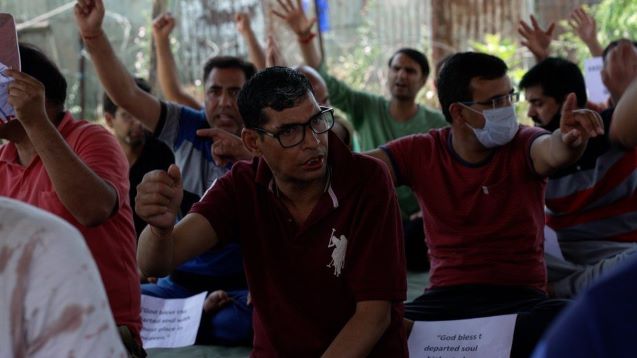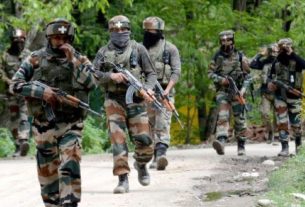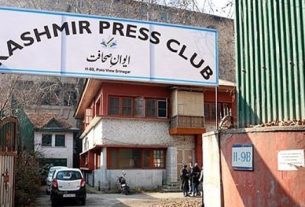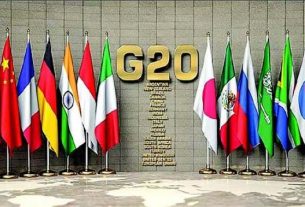On the way to the government high school in Gopalpura village, in the southern part of Indian-administered Kashmir, is a rushed tribute to a much-loved teacher.
Six stones encircle the spot where 41-year-old Rajni Bala was killed on the morning of 31 May.
Students and staff were just gathering for prayers outside the school building when they heard a sound like a firecracker. But in a region where violence is a part of everyday life, they immediately knew something was wrong.
Rajni Bala was shot in the head by anti-India militants, police said.
It’s widely believed that she was targeted because she was a Hindu, a minority in the country’s only Muslim majority region. There has been a wave of Hindu killings in the past year – the latest just last week. Sunil Kumar Bhat was shot dead in an apple orchard in the Shopian area of south Kashmir.
Rajni’s family say they had tried to move out of Kashmir before the attack on her.
“A month-and-a-half ago, a Hindu driver was killed a couple of kilometres from the school, and there had been other attacks on Hindus in different parts of Kashmir. Since then we were scared and we’d applied twice for a transfer for Rajni,” her husband Rajkumar Attri said.
Rajni Bala taught history and loved the school she’d worked at for five years. She’d told her colleagues she would have never wanted to move if not for the threat.
“She was such a decent person, so full of knowledge and friendly. She was adored not just in our school, but in our entire village,” said Saima Akhtar, a science teacher. “We are devastated.”
Since the killing, only half the students were attending classes and trauma was visible on the faces of those who had made it to school.
Mr Attri has now moved out of the region with their teenage daughter.
The killings have brought back memories from 30 years ago, when hundreds of Hindus were killed by militant groups, triggering an exodus of the community from the region.
It was at the start of Indian-administered Kashmir’s complex conflict, which has raged on for decades.
Since the late 1980s, Kashmir Valley has been gripped by an armed insurgency, which India accuses Pakistan of fuelling in order to disrupt peace in the region that is disputed between the two countries. Islamabad denies the accusations.
Over the decades, thousands of Indian security forces, militants and civilians have been killed in the conflict.
But since 2003, the Hindu community has rarely been specifically targeted. In fact, since 2010, there have been efforts to bring back those who had left, with government jobs and flats given as incentives.
Lt-Governor Manoj Sinha, the region’s top administrator appointed by the Indian government, told BBC Hindi that the number of targeted attacks on civilians needed to be measured over a longer period of time.
“These are very sad incidents. But if you look at targeted killings, not just of Hindus but of all civilians in the past 10 to 15 years, then it’s a number that’s reducing now. The atmosphere of fear is not as grave as it was earlier,” he said.
But Kashmiri Hindus, who returned to the region in the past decade, say they fear for their lives and want to leave again.
In a resettlement colony in south Kashmir, scores of Kashmiri Hindus who came back to the region through the government incentive programme have been sitting in protest, demanding to be relocated.
“Since we returned, we’ve had many problems, such as the condition of the homes we’ve been given. But we didn’t feel targeted. Now, we have begun to fear for our lives,” said Sandeep Raina, an engineer who works in public services.
“I was 10 when my family fled in the 1990s. My son is now at a similar age and we want to leave again,” he added.
“If someone next to me takes their hands out of their pocket, I feel they’re going to pull out a gun to shoot me. We’ve stopped sending our children to school and we hardly go out of our compound,” said Sanjay Koul, a public school teacher.
Resettling Kashmiri Hindus back in the region has been one of the campaign promises of India’s governing Bharatiya Janata Party (BJP). Many of the Hindus at the camp said there was pressure on them from the government to not leave, as it would dent that promise.
The government did not respond to these allegations.
Militant groups say they are attacking minorities and outsiders because they believe India’s Hindu nationalist government is trying to change the religious demographic of the Muslim-majority Kashmir.
It’s an allegation the Indian administration rejects. Its actions, though, have fuelled distrust.
In 2019, the federal government revoked Kashmir’s autonomy, imposing federal rule in the region, and allowed outsiders to purchase land. There is no elected regional government, while large sections of the police and bureaucracy are now dominated by officers from other parts of the country.
Anger against the Indian state, which has long been felt in some parts of Kashmir, has grown since 2019.
In the village of Turkwangam, 20-year-old Shoaib Mohammad Ganaie, a Muslim civilian, was shot dead on 15 May.
His family said he was outside a car spare parts shop they had set up a few months earlier, when a paramilitary soldier pointed a gun at him and asked him to raise his hands. Shoaib followed the order, his relatives said, but the soldier still shot him in the chest.
Shoaib’s father, Ghulam Mohammad Ganaie, 50, spends the whole day tending to his son’s grave.
“Shoaib was a civilian, a student and a shopkeeper. What was his crime?” he said as he broke down. “We want justice for this cruelty inflicted on us. A piece of our hearts has been taken from us.”
He shows a photo of his son, who loved playing cricket, wearing sporting gear and holding up a big trophy.
The police and paramilitary told the BBC that Shoaib was killed in a crossfire. But multiple eyewitnesses insisted there was no gunbattle for him to get caught in.
An inquiry has been ordered into the incident. His father says he is grateful to local officers for helping the family to get Shoaib’s body released to them quickly, but he has no hope that the truth of what happened to his son will come out.
“If we had our own government, we could at least hold someone to account. Here, there is no-one to listen to us, no-one to ask any questions of. They don’t need votes from us, so why would they care?” Mr Ganaie said.
There have been many such allegations of killings of civilians by security forces in recent months.
The Indian government did not respond to the BBC’s questions about such cases.
Lt-Gov Manoj Sinha said an elected government would be put in place at an “appropriate time” as decided by India’s home ministry, without elaborating on what that means.
As Mr Ganaie left his home to walk to his son’s grave again, he said, “No one is safe in Kashmir. When you leave your home, you don’t know if you’ll return in the evening.”__Courtesy BBC.com





